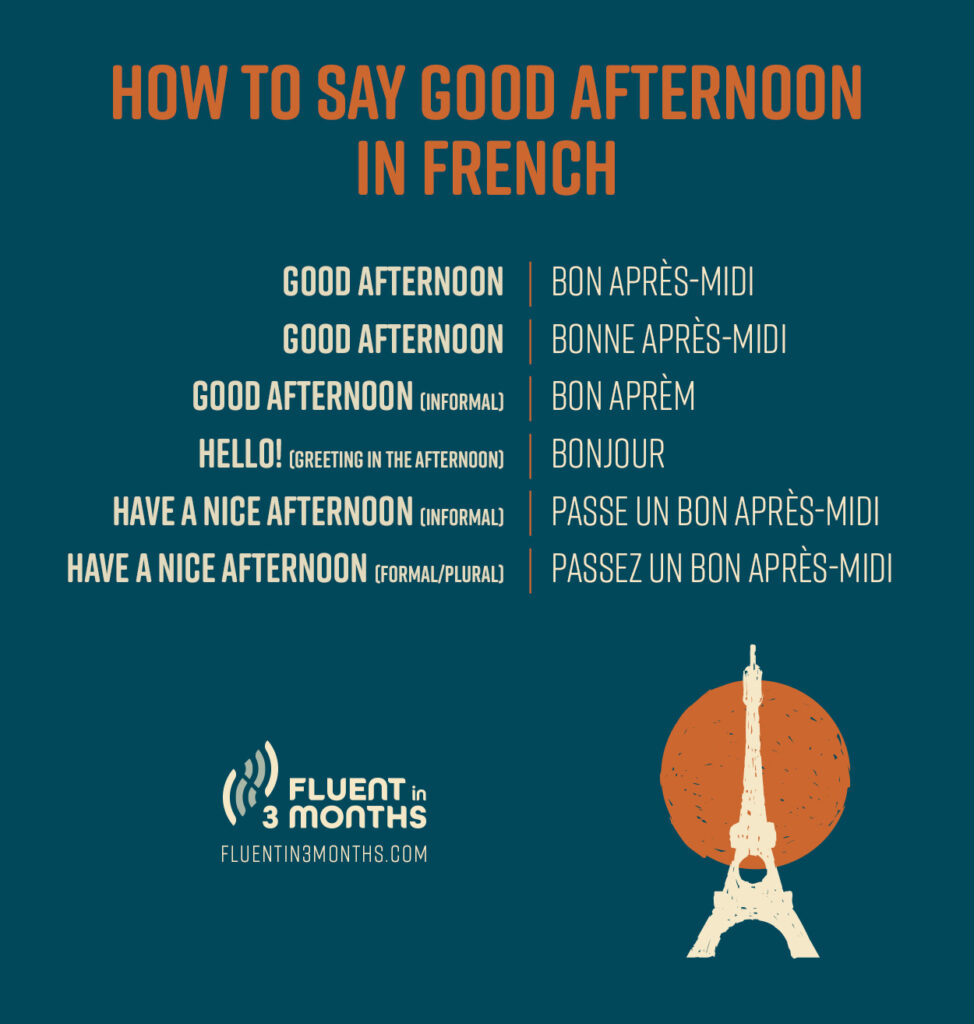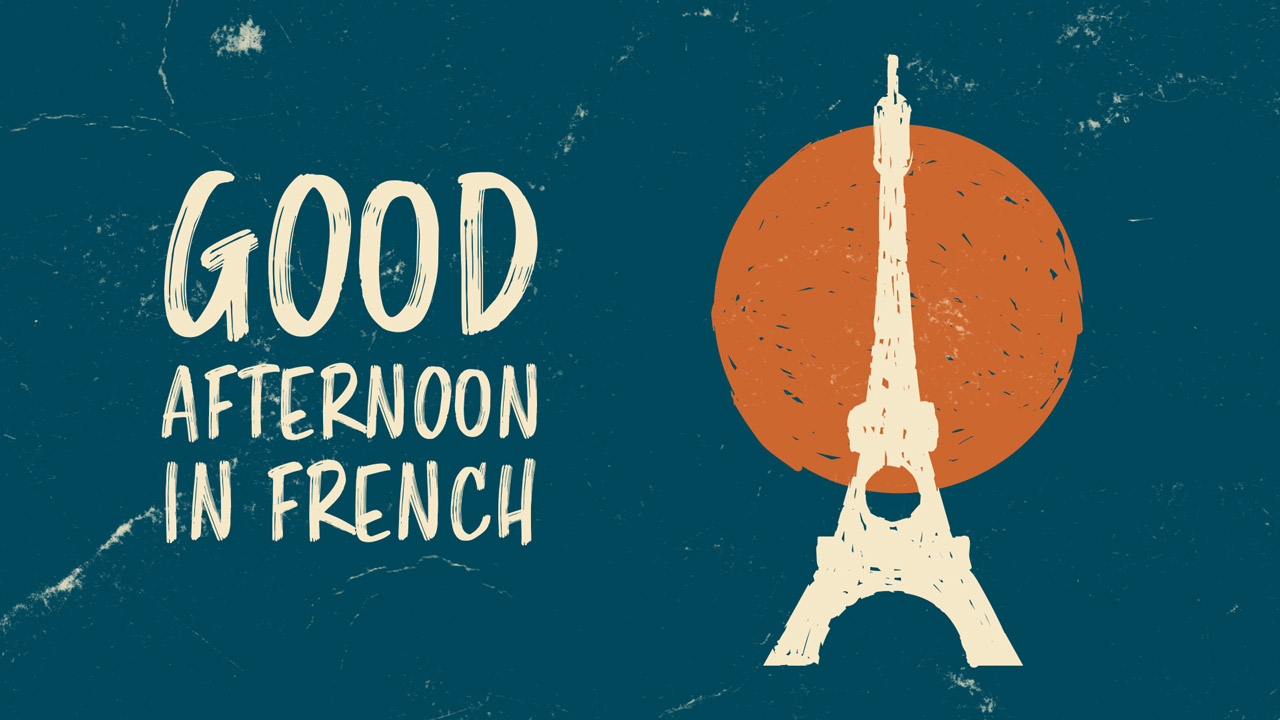How to Say “Good Afternoon” in French
“Good afternoon” in French is bon après-midi, where bon means “good,” and après-midi means “afternoon”.
But bon après-midi isn’t a greeting phrase, it’s a goodbye phrase, similar to the English “have a good afternoon.”
If you’re greeting someone in the afternoon, you would most likely say bonjour or salut; both mean “hello.”
As a French learner, you probably know that the language varies in France, Switzerland, Canada, and Belgium. As a fluent speaker who has lived in France and Belgium, I can confirm that even the numbers change from country to country.
The same goes with bon après-midi, especially in French French and Canadian French. In this article, we’ll cover country-specific ways of saying “good afternoon,” example sentences, and formal and informal variations.
Table of contents
- Good Afternoon in French
- Bon après-midi vs. Bonne après-midi: What’s the Difference?
- How to Say Good Afternoon as a Greeting in French
- How to Say Good Afternoon as a Parting in French
- Formal vs Informal Good Afternoon in French
- Good Afternoon in Canadian French
- Other French Greetings and Partings for the Afternoon
- Example Phrases with Good Afternoon in French
- You Took One More Step in Becoming Fluent in French
Good Afternoon in French
Here’s the French vocabulary you’ll learn in this article, which are the main ways of saying “good afternoon” in French:
| English | French | Audio |
|---|---|---|
| “Good afternoon” | Bon après-midi | |
| “Good afternoon” | Bonne après-midi | |
| “Good afternoon” (informal) | Bon aprèm | |
| “Hello!” (greeting in the afternoon) | Bonjour | |
| “Have a nice afternoon” (informal) | Passe un bon après-midi | |
| “Have a nice afternoon” (formal/plural) | Passez un bon après-midi |

Bon après-midi vs. Bonne après-midi: What’s the Difference?
Both bon après-midi and bonne après-midi mean “good afternoon,” and there is no difference between them. Bon is the masculine version of the adjective “good,” and bonne is the feminine version.
According to Larousse French Dictionary, après-midi is an invariable word which can be used as masculine and feminine. This means both versions of “good afternoon” in French are correct. That said, the masculine version is more common, so you’ll hear and see bon après-midi more often than bonne après-midi.
How to Say Good Afternoon as a Greeting in French
If you want to greet people in the afternoon, bonjour is the most common way to do so. It literally translates to “good day,” and can be used throughout the day, from the morning until the evening hours.
For example, if you stop by a bakery in Paris at 2pm, you would greet the staff with bonjour! Similarly, if you meet a friend for coffee at 4pm, you can also say bonjour! As bonjour is used in both formal and informal situations, you can say it to greet friends, coworkers, service staff, or even strangers you encounter in shops. If you want to use the word “afternoon” with your greeting, you can say Bonjour, j’espère que vous passez un bon après-midi, (“Hello, I hope you’re having a good afternoon”).
How to Say Good Afternoon as a Parting in French
The phrase bon après-midi is often used as a parting phrase in French. It would translate to “have a good afternoon” in English, which means that it’s not commonly used while greeting people.
In informal situations, such as when you’re speaking with friends, it’s also common to say bon aprèm instead of bon après-midi. Let’s take a look at the dialogue below:
Laura: Bonjour, Thomas! Ça va? (“Hi, Thomas! How are you?”)
Thomas: Salut! Ça va, et toi? (“I’m good and you?”)
Laura: Ça va. Je viens de sortir du travail. (“I’m good. I just got out of work.”)
Thomas: Tu as des plans pour le reste de ton après-midi? (“Do you have plans for the rest of your afternoon?”)
Laura: Je vais juste rentrer chez moi et me détendre. Et toi? (“I’ll just go back home and relax. And you?”)
Thomas: Pareil. Bon après-midi, Laura! (“Same for me. Have a good afternoon, Laura!”)
Laura: Passe un bon aprèm! (“Have a good afternoon!”)
As you can see, the two friends greet each other with bonjour and salut, talk about their afternoon plans, and use bon après-midi and bon aprèm as a way to say goodbye in French.
Formal vs Informal Good Afternoon in French
You can use bon après-midi in both formal and informal settings. For a more formal touch, consider adding the person’s title. For example, when you’re leaving a restaurant, you might hear the servers say, bon après-midi, Monsieur (“Have a good afternoon, sir) or bon après-midi, Madame (“have a good afternoon, miss”).
Sometimes, bon après-midi becomes bon aprèm. Aprèm is the short version of après-midi, often used between friends as we covered in the dialogue above.
Good Afternoon in Canadian French
In Québec, some French speakers use the phrase bon après-midi to specifically mean “good afternoon” as a greeting, similar to English. They also say bon matin, meaning “good morning.”
For example, if you visit a shop in Montreal at 3pm, the shopkeeper might greet you with a “bon après-midi, bienvenue!” (“Good afternoon, welcome!”) While in France, they would say bon après-midi when you’re leaving, as in “have a good afternoon.” That said, you can still say bonjour in Quebec, at any time of the day.
Other French Greetings and Partings for the Afternoon
In addition to bonjour and bon après-midi, there are several other useful French words you can use in the afternoon hours.
| English | French | Audio |
|---|---|---|
| “Hi!” | Salut! | |
| “How are you?” (formal) | Comment allez-vous ? | |
| “How are you?” (informal) | Ça va ? | |
| “Good evening” (used in late afternoon or evening as a parting phrase) | Bonne soirée | |
| “See you later” | À plus tard | |
| “See you tomorrow” | À demain | |
| “Goodbye” | Au revoir | |
| “Have a nice day” (formal) | Passez une bonne journée | |
| “Have a nice day” (informal) | Passe une bonne journée | |
| “Have a nice afternoon” (formal) | Passez un bon après-midi | |
| “Have a nice afternoon” (informal) | Passe un bon après-midi |
Example Phrases with Good Afternoon in French
Last but not least, let’s check some example sentences featuring “good afternoon” in French.
| English | French | Audio |
|---|---|---|
| “Hello, I hope you’re having a good afternoon.” (European French, formal) | Bonjour, j'espère que vous passez un bon après-midi. | |
| “Good afternoon, how are you?” (Canadian French, Formal) | Bon après-midi, comment allez vous? | |
| “Have a good afternoon, see you tomorrow!” (Informal) | Bon aprèm, à demain! | |
| “Have a good afternoon, rest well!” (Informal) | Bon aprèm, repose-toi bien! | |
| “Hi, how is your afternoon going?” (Informal) | Salut, comment se passe ton après-midi ? | |
| “I’m having a very good afternoon, thanks.” | Je passe un très bon après-midi, merci. | |
| “Enjoy your afternoon at the park!” (Informal) | Profite de ton après-midi au parc! | |
| “Have a nice afternoon with your parents.” (Informal) | Passe un bon après-midi avec tes parents. |
You Took One More Step in Becoming Fluent in French
“Good afternoon” may be one of the handy words you’ve learned for your trip to France, or a part of your beginner’s course. Either way, top them up with some other core French words, such as learning how to say how are you or talking about your family and friends. Greet your French teacher, start conversations during your next trip abroad, or simply impress your French friends with your new vocabulary. Bonne chance et bonne après-midi! (“Good luck and have a good afternoon!”)



Social